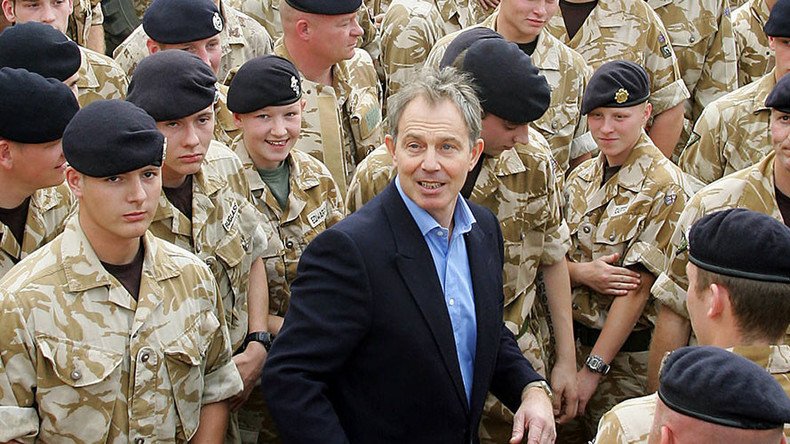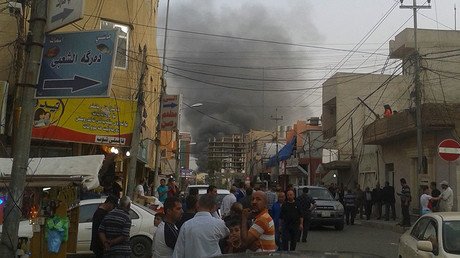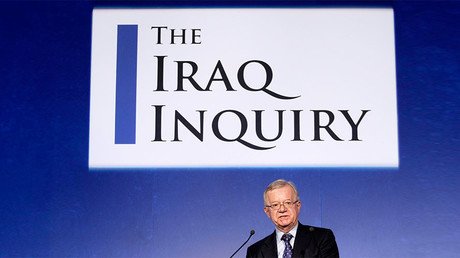‘Military action was not a last resort’: Chilcot finally releases Iraq War report

Britain chose to join the invasion of Iraq in 2003 before peaceful options for disarmament had been exhausted, the Chilcot Inquiry has found. Sir John Chilcot’s seven-year inquiry concluded that military action “was not a last resort.”
The massively delayed and hugely controversial Chilcot Inquiry, reporting back on Wednesday, was tasked with examining the first eight years of the war, starting with the run-up to hostilities and including the period of occupation.
The report’s main focus is on what commitments then-Prime Minister Tony Blair gave to then-US President George W Bush ahead of the invasion, and whether the former PM misled the British public over the threat posed by weapons of mass destruction (WMD), which turned out to be non-existent.
Others in line for criticism include spy agency MI6 for providing inaccurate intelligence, and military commanders for failing to stand up to Blair.
Speaking on the findings of the report, Sir John Chilcot says the severity of the threat posed by Iraq’s WMDs was “presented with a certainty that was not justified.”
He says “despite explicit warnings, the consequences of the invasion were underestimated,” and the planning for Iraq after Saddam Hussein was “wholly inadequate.”
Chilcot says the government “failed to achieve its stated objectives.”
After the attacks in New York on September 11, 2001, Blair urged Bush not to take hasty action on Iraq, Chilcot says.
But by early December, US policy had begun to shift and Blair suggested the US and the UK should work together on what he described as a “clever strategy” for regime change in Iraq, which would “build over time.”
When Blair met Bush in Texas in April 2002, the formal policy was still to contain Saddam. But by then there had been a profound change in the UK’s thinking, Chilcot says.
“The Joint Intelligence Committee had concluded that Saddam Hussein could not be removed without an invasion.
“The government was stating that Iraq was a threat that had to be dealt with. It had to disarm or be disarmed.”
Britain’s formal decision to invade Iraq, if Saddam did not accept the US ultimatum to leave within 48 hours, was taken by the Cabinet on March 17, 2003. Parliament voted the following day to support the decision.
On Wednesday, thousands of anti-war supporters staged a demonstration in Westminster, demanding “truth and justice” and calling for Blair and others to face the full force of the law.
Kate Hudson, protest organiser and CND general secretary says: “The Iraq War was a disaster, a disaster that began with a lie.
“If Tony Blair and other politicians responsible had told the truth it would never have happened. A country was destroyed, millions of innocent Iraqis were killed, British soldiers were killed, and terrorism has spread across the Middle East. Those responsible must now be brought to justice.”
Current Labour Party leader Jeremy Corbyn will respond to the report in Parliament during prime minister’s questions on Wednesday.
He is understood to have concluded that international laws are neither strong nor clear enough to make any war crimes prosecution a reality, and is expected to fulfill a campaign promise to apologize on behalf of the Labour Party for the war.
Alex Salmond, the former Scottish National Party (SNP) leader, has called for the impeachment of Blair and argues that the findings of the report, even if it fails to declare the war illegal, could open the way for legal action.
Blair is planning to hold a press conference on Wednesday to deliver a response to the findings.
It is expected he will insist the Shia-Sunni split in Iraq, one of the driving forces of the continuing violence, preceded the invasion and was not the result of the disruption created by the war.
The Chilcot report runs to 12 volumes totalling 2.6 million words. It was supposed to take two years to complete, but took seven.














